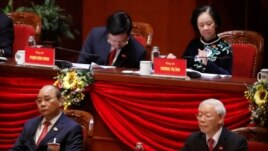15 July 2021
The Vietnamese government is fighting political disapproval online with social media "influencers" who are usually soldiers.
Force 47 is Vietnam's online information warfare unit. It has thousands of soldiers who perform normal duties in addition to their online work. They create and moderate online material to correct "wrong views" on pro-state Facebook groups.
Reuters studied state media reports and broadcasts. It found that, since Force 47 was created in 2016, it has set up hundreds of Facebook groups and pages. It also published thousands of pro-government stories and posts.
Social media researchers say the group may be the largest and most complex influence network in Southeast Asia. It is playing an important role in the country's intensifying dispute with Facebook.
A Facebook source told Reuters last week that the company had removed a group called "E47." The group used military and civilian members to report posts to have them taken down. The person said the group was connected to a list of Force 47 groups identified by Reuters.
A Facebook spokesperson confirmed that some groups and accounts were taken down last Thursday for organizing attempts to report a lot of posts. A person with the company said the action was one of Facebook's largest takedowns started under its mass reporting policy.
But many of the Force 47 accounts and groups identified by Reuters remain active. The company source said they do not violate Facebook policies because they are operated by users under their real names.
Facebook has become an important tool for political speech in Vietnam. This has created a dispute between Facebook and the country over the removal of material said to be "anti-state."
The ruling Communist Party in Vietnam controls the media and accepts little criticism.

Vietnam's President and General Secretary of the Communist Party Nguyen Phu Trong (R, bottom) and Prime Minister Nguyen Xuan Phuc (L, bottom) attend the closing ceremony of the 13th national congress of the ruling communist party of Vietnam at the National Convention Center in Hanoi, Vietnam February 1, 2021. The Vietnamese communist party has been greatly enforcing its laws against political disapproval messages online in recent years through social media sites like Facebook. (REUTERS/Kham)
Last year, Vietnam slowed down Facebook traffic until the company agreed to increase the censorship of political material on its service in Vietnam. Months later, officials threatened to close Facebook in Vietnam if the company did not restrict additional material in the country.
A Facebook spokesperson told Reuters that the company's goal was to keep its services online "for as many people as possible to express themselves, connect with friends and run their business."
The spokesperson said Facebook has been honest about its efforts to continue operating in Vietnam.
Skilled and hostile
There is no official definition of what a "wrong view" is in Vietnam. But activists, reporters and social media users have all received long jail terms in recent years for spreading opinions opposed by the Communist Party.
Le Van Dung, who goes by the name "Le Dung Vova," is a leading activist who regularly broadcasted live to thousands of followers on Facebook. Last week, he was arrested after more than a month on the run, a police statement said.
Dung was detained on charges of "making, storing, spreading information, materials and items for the purpose of opposing the state," under Vietnamese law.
He faces up to 20 years in prison if found guilty.
The size of Force 47 is not known. But in 2017, the general of the unit at the time, Nguyen Trong Nghia, said it had 10,000 members. However, the Reuters study of known Force 47 Facebook groups showed tens of thousands of users.
The Facebook source said the company acted against the E47 group which is made up of military members and civilians.
"Struggle on the internet"
Vietnamese state media reports named at least 15 Facebook pages and groups it said were controlled by Force 47. Reuters found that collectively these groups had over 300,000 followers.
Force 47 soldiers appear to carry out their social media activities and create locally targeted material along with their usual duties.
The reports showed Force 47 also creates anonymous email addresses with Gmail and Yahoo. And they make accounts with two social media sites: YouTube and Twitter.
YouTube said that it closed nine channels last Friday for violating its policies on spam. This included an account identified by Reuters as a suspected Force 47 operation.
Twitter said it had not seen any activity by Force 47.
Dhevy Sivaprakasam is a writer for the internet rights group Access Now. She said, "We are witnessing the creation of a reality where people are not safe to speak freely online, and where there's no concept of individual privacy."
I'm Gregory Stachel.
James Pearson reported this story for Reuters. Gregory Stachel adapted it for VOA Learning English. Mario Ritter, Jr. was the editor.
______________________________________________________________
Words in This Story
post – n. a message on an online message board
source –n. someone who provides information
view –n. an opinion or way of thinking about something
account – n. an arrangement in which a person uses the Internet or e-mail services of a particular company
censor – v. to examine books, movies, or letters in order to remove things that are considered to be offensive, immoral, or harmful to society
item –n. a separate piece of news or information
anonymous – adj. made or done by someone unknown
spam – n. e-mail that is not wanted: e-mail that is sent to large numbers of people and that consists mostly of advertising
concept – n. an idea of what something is or how it works